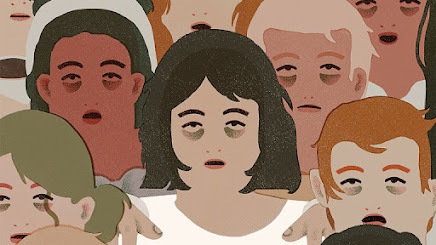In 1963, a high school student managed to stay awake for more than 264 hours.
Too little sleep is more than an inconvenience. New studies suggest permanent brain damage and disease could result.
The sleep debt collectors are coming. They want you to know that there is no such thing as forgiveness, only a shifting expectation of how and when you're to pay them back.
You think of them as you lie in bed. You fall asleep, then you wake up in a cold sweat an hour later. You fall asleep, then wake up, drifting in and out of consciousness until morning.
As most every human has discovered, a couple of nights of bad sleep is often followed by grogginess, difficulty concentrating, irritability, mood swings and sleepiness.
For years, it was thought that these effects, accompanied by cognitive impairments like lousy performance in short-term memory tests, could be primarily attributed to a chemical called adenosine, a neurotransmitter that inhibits electrical impulses in the brain.
Spikes of adenosine had been constantly observed in sleep-deprived rats and humans.
Adenosine levels can be quickly righted after a few nights of good sleep, however. This gave rise to a scientific consensus that sleep debt could be forgiven with a couple of quality snoozes - as reflected in casual statements like ''I'll catch up on sleep'' or ''I'll be more awake tomorrow.''
But a review article published recently in the journal Trends in Neurosciences contends that the folk concept of sleep as something that can be saved up and paid off is bunk.
The review, which canvassed the last couple of decades of research on long-term neural effects of sleep deprivation in both animals and humans, points to mounting evidence that getting too little sleep most likely leads to long-lasting brain damage and increasing risk of neurodegenerative disorders including Alzheimer's disease.
''This is really, really important in setting the stage for what needs to be done in sleep health and sleep science,'' said Mary Ellen Wells, a University of North Carolina at Chapel Hill sleep scientist, who did not contribute to the review.
It has long been known that intense periods of sleep deprivation are bad for your health. Forced insomnia was used for centuries as punishment. In the first experimental study of sleep deprivation, published in 1894 by Russian scientist Maria Manassena, puppies were forced to stay awake through constant stimulation; they died within five days.
Manesseina observed that ''the brain was the site of predilection of the most severe and most irreparable changes.'' Blood vessels had hemorrhaged. ''The total absence of sleep is more fatal for the animals than the total absence of food,'' she concluded.
But there were many ways to not get enough sleep. You can go entirely without sleep for an extended period of time - what scientists call acute sleep deprivation.
In 1963, a high school student managed to stay awake for 264 hours. You can consistently miss out on sleep - chronic sleep deprivation. You can lie awake, mind racing, or relax, watching television all night.
Studies like Manassina's were seen as extreme to the point of being irrelevant to humans.
Research continued, but ''that was where it was sort of pigeonholed,'' said Fabian Fernandez, a neuroscientist at the University of Arizona who did not contribute to the new review.
''When are you ever going to keep an animal or human being awake until they die? ''
Over the past couple of decades, however, the animal research on sleep deprivation has become more nuanced, precise and, possibly applicable to humans, according to Dr. Sigrid Veasey, a neuroscientist at the University of Pennsylvania, and Zachary Zamore, a researcher in Dr. Veasey's lab, the authors of the new review.
The Essay and Publishing continues into the future. The World Students Society thanks author Oliver Whang.

.png)


0 comments:
Post a Comment
Grace A Comment!